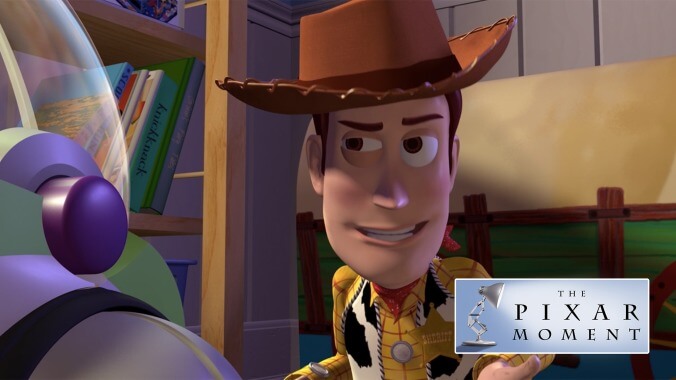One of Toy Story’s most daring innovations was making its hero, Woody, kind of a jerk
Image: Screenshot: Toy Story
It’s a funny thing to say about one of the most beloved Disney characters of the last 25 years, but Woody can be kind of a prick, can’t he? The cowboy-doll hero of Toy Story and its three sequels always does the right thing eventually, getting his priorities straight in time to save the day. But en route to that enlightenment, he does plenty of wrong things too, like holding grudges against his fellow toys and ditching his friends. Woody can be selfish, petulant, vain, resentful, churlish, and petty. Which is to say, he can be very human, plastic features aside. Those less flattering qualities also make him among the most three-dimensional of cartoon characters, regardless of whether the audience is watching him from behind a pair of flimsy glasses.
There are any number of moments worth highlighting in Toy Story, Pixar’s first feature and hence the subject of this inaugural installment in our new five-week series. We could have picked Woody and Buzz being tossed into Sid’s room and encountering the misfit mad-science experiments he’s made from his own toy box—a sequence that announced Pixar would dare to go a little weirder and scarier than Disney proper. Or how about Buzz getting a televised reality check, the first time this all-ages franchise waded into the deep existential implications of its premise? And of course there are action scenes that show off what was, back in 1995, some truly revolutionary computer animation. But the most significant precedent set by Toy Story might be Pixar’s willingness to build a whole movie around a character as complex and flawed and, yes, sometimes downright dickish as Sheriff Woody. And so while it might not be the most iconic scene in the movie, Woody’s first confrontation with Buzz Lightyear speaks to the emotional truths the studio was after from the very start.
Things are uneasy from the moment the two meet on the surface of Andy’s bed, with Woody immediately defensive about all the attention lavished on the shiny new space-ranger toy by both their six-year-old owner and the other occupants of his bedroom. But it’s a few minutes and one Randy Newman song later that the tension between them fully boils over into rivalry. There’s a case to made that Toy Story is still the funniest Pixar movie, and it comes down to the perfectly calibrated buddy-comedy dynamic between its two main characters—the way the enduringly witty script (coauthored by future Pixar director Andrew Stanton and Joss Whedon, among others) pits Buzz’s inflated hero complex against Woody’s exasperation at his cluelessness. That’s on full display in this scene, a triumph of vocal performance, antagonistic dialogue, and staging. (There might be better illustrations elsewhere of Pixar’s nascent technical sophistication, but don’t sleep on the screwball hilarity of Woody’s poker-faced reactions to Buzz writhing in imaginary suffocation without his helmet on.)
What sticks out most about the scene is just how unlikable Woody is allowed to be. Simba and Aladdin, to name two basically contemporaneous Disney protagonists, weren’t saints either; they had their own character flaws to overcome. But neither got a moment quite as bitter as Woody’s warning to Buzz: “You stay away from Andy, he’s mine,” he bluntly tells the interloper threatening his status as favored plaything. “And no one is taking him away from me.” Woody’s jealous mockery curdles further later in the scene, when the two find themselves helpless to stop Sid, the sadistic, toy-mangling kid who lives next door, from exploding an action figure. “I’d love to see you as a crater,” Woody tells Buzz, which is a pretty callous remark to make just seconds after watching a G.I. Joe ripoff blown to smithereens. A few minutes later, he attempts to knock his new enemy behind the desk and out of Andy’s line of sight—a craven scheme that kicks the adventure plot into motion.
He’s sometimes a real asshole. But Toy Story gets away with it, for a few reasons: because Buzz is a frustratingly deluded dolt, albeit a funny one; because Woody redeems himself in the climax, getting over his space-man envy; and because the character’s voiced by America’s dad himself, Tom Hanks, who can’t help but invest this sentient hunk of plastic with his signature warmth and humanity, even when his animated avatar is at his most caddish. Mostly, though, we forgive Woody his trespasses because it’s easy to see plenty of ourselves in them. Here, and in the sequels, he remains relatable in his insecurity, because who in the audience hasn’t stewed with jealousy toward a sibling, feared they were inadequate in the eyes of a loved one, or questioned their purpose or the stability of their relationships? Disney is sometimes referred to as the house that Mickey built. Pixar, then, is the house that Woody built, on a foundation of imperfection and the acknowledgement that good toys (or people) sometimes behave badly. Movies tend to be more interesting when they do.